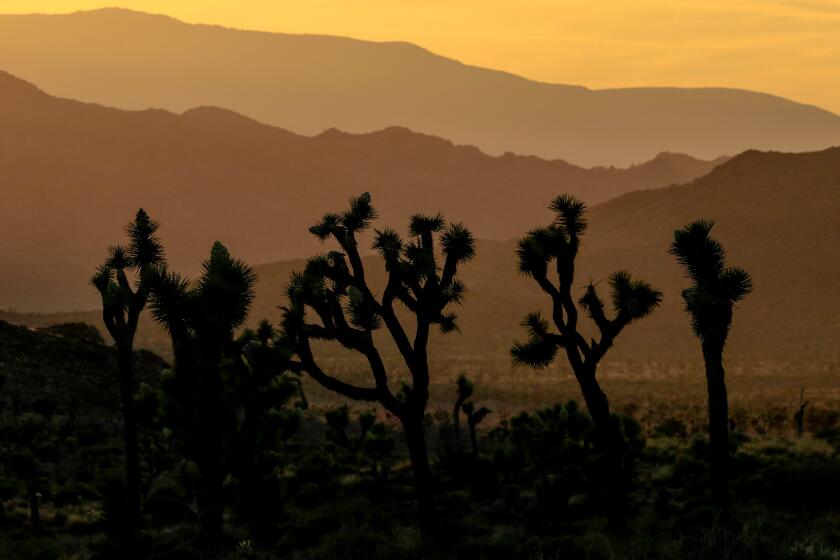D.A.’s Environmental Crime Unit Thinks Big
Orange County is known for its stunning 42-mile coastline, dotted by rocky coves, delicate tide pools and stretches of sandy beach. In recent years, the county has also become recognized in legal circles for aggressively prosecuting those who harm those picturesque shores and other natural resources.
The district attorney’s environmental crimes unit has taken on an array of powerful targets, from multinational corporations that threaten local drinking water supplies to the city of Huntington Beach, which pleaded guilty to pollution charges.
“Orange County has always had an outstanding reputation for having a strong environmental unit,” said Gale Filter, environmental project director with the California District Attorneys Assn. in Sacramento.
Bruce Klafter, immediate past chairman of the state bar’s environmental law section and an advisor to the section, agrees. “They certainly seem to be busier and doing higher-profile cases than many of the other units.”
In most parts of the United States, environmental prosecution is handled at the state level. But in California, most large cities and counties handle such crimes within their borders.
The state does have roving prosecutors doing the work in rural areas that can’t afford to do it themselves. That state program was modeled on environmental crimes units launched in several counties across the state, including Orange County, said Filter, who helped develop the state program.
Most large cities and counties have environmental crimes units. In the Los Angeles County district attorney’s office, four lawyers take on oil spills, illegal hazardous waste transportation, fraudulent automobile smog checks and other crimes, said Deputy Dist. Atty. Richard Sullivan.
“This unit’s heyday was probably in the late ‘80s, when we may have had as many as 10 D.A.s,” he said. “Over the years, resources have been taken away.”
In contrast, Orange County Assistant Dist. Atty. Joe D’Agostino said, the amount of resources allocated for his county’s unit has more than tripled since Dist. Atty. Tony Rackauckas took office in January 1999. Staffed with 10 attorneys, four investigators, two paralegals and a clerical staff, the Orange County environmental SWAT team is handling about 100 cases. About 80% are criminal prosecutions; the remainder are headed to civil court.
“We are the model,” D’Agostino said of the unit he heads. “I can proudly babble on about it. It is considered one of the best in the country.”
Rackauckas said prosecuting environmental crimes is as important as other types of criminal prosecution--and an effective deterrent.
He said that he decided to make it a priority when he realized the office could have a significant effect on Orange County’s environmental future.
“I was becoming aware of some of the problems that we have with some of the various violations, and I didn’t want to be sitting around 10 or 15 years from now thinking ‘We could still have a real environment if the D.A. would have prosecuted some of these violations,’ ” he said. “It’s important to stay on top of things so that our environment doesn’t get reduced in terms of health and safety.”
Chris Evans, a former top administrator for Rackauckas who has become a major critic, said he strongly disagrees with leadership changes the district attorney has instituted in the division.
But “the county is served well,” said Evans, executive director of the Surfrider Foundation in San Clemente. “There has been a history of hard-charging, dedicated career prosecutors in that unit.”
One high-profile case involves leaking storage tanks beneath 330 gas stations that allowed a possible carcinogen to taint groundwater. Prosecutors are seeking millions of dollars in civil penalties from Atlantic Richfield Co., BP Amoco Corp., Thrifty Oil Co., Shell Oil Co., ARCO Chemical Co. and Lyondell Chemical Co.
The case, scheduled to go to trial in January, is among the biggest MTBE contamination suits in the nation and is being closely watched by other communities affected by the gasoline additive.
“That has become their bailiwick,” Filter said. “That’s their focus because of the inherent danger that exists with underground storage tanks in Orange County.”
On Monday the office filed 17 felony pollution charges against a Buena Park chrome-wheel manufacturing company, its owner and three employees. A two-year investigation led to allegations that the men dumped heavy metals, corrosive acid and other hazardous waste into sewer and storm-drain systems. They face up to 11 1/2 years in state prison and $1 million in fines if convicted of all charges.
Another noteworthy case the unit is handling involves a former Huntington Beach city councilman charged with polluting 14 acres of the Bolsa Chica wetlands.
John Thomas, an oil well rig owner who served on the council from 1978 to 1986 and ran on an environmental platform in an unsuccessful bid for the county Board of Supervisors, is accused of dumping 38,000 cubic yards of wood chips and dirt and an unspecified amount of oil there. A judge is scheduled to decide next week whether the matter will go to trial.
The office made headlines last year when a lengthy investigation led to charges against Huntington Beach for allowing millions of gallons of raw sewage to leak from aging underground pipes.
In a highly unusual admission of criminal culpability, the city pleaded guilty to three misdemeanors and was placed on probation for five years.
Cases such as these have ensured that within the Orange County district attorney’s office, the unit is viewed as a prestigious station. In recent years, two judges--one elected and one appointed--have come from the unit.
D’Agostino said: “The reason people are here is because they’ve asked to work here. We have a couple of people--this was their dream job.
“It’s a big deal in Orange County. We have a sophisticated, educated populace,” D’Agostino said. “It’s funny: We’re considered a conservative Republican county, [but] we’re very protective of the environment.”
More to Read
Sign up for Essential California
The most important California stories and recommendations in your inbox every morning.
You may occasionally receive promotional content from the Los Angeles Times.










